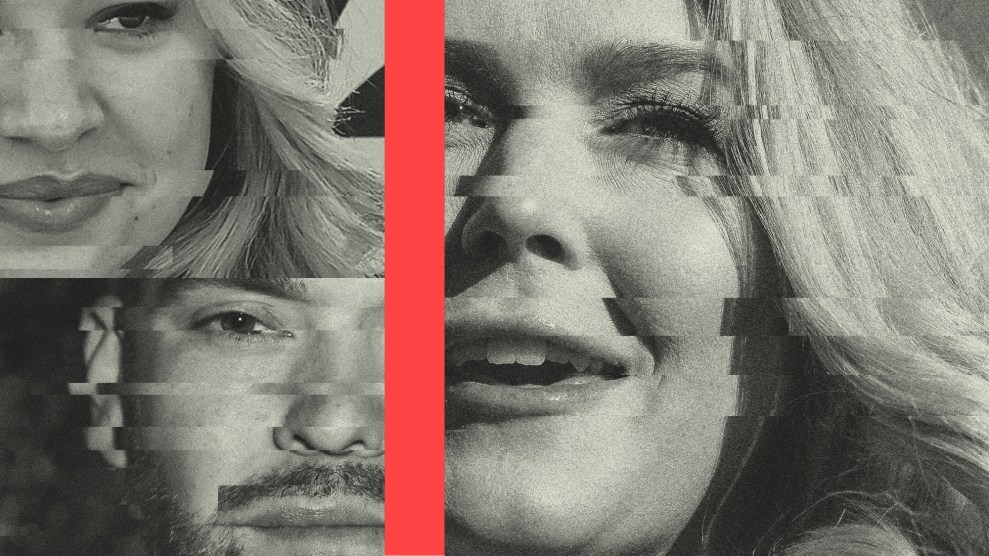A list of political songs, by its nature, begs the question: what is political? Dave Marsh’s list enumerates songs that broke through, making a difference while getting radio airplay. In a way, their “largeness” changed the world.
This list comes from a different sensibility. Most of them didn’t make the top 40…or even the top 100. They rose from the underground and made their voices heard almost in spite of the odds. They’re “political” in the broadest sense: they speak to the empowerment of individuals in small moments, which often means just as much as taking on entire governments. And it makes for a pretty good mix tape as well. Happy listening.
Boogie Down Productions, “Love’s Gonna Get’Cha (Material Love)”
(Edutainment, Jive/RCA, 1990)
Sharp, articulate, and cutting, KRS-One (Chris Parker) is rap music’s conscience. Born out of the Bronx as well as the catalogs of Grandmaster Flash and Afrika Bambaataa, he continues both the style and substance of Old School rap. “Material Love'”s cautionary tale of ghetto drug dealing resonates because it doesn’t preach or glorify, only describes.
Elvis Costello and the Attractions, “Peace in Our Time”
(Goodbye Cruel World, Columbia, 1984)
At the height of “Morning in America” Reaganist jingoism, Elvis took this spare, folkish rant to The Tonight Show and nearly got booed offstage. Funny how it took an Englishman to expose the audacity of the Grenada invasion (“Just another tiny island invaded/when he’s got the whole world in his hands”) and Star Wars (“There’s already one spaceman in the White House/what do you want another one for?”). Twelve years after the world wouldn’t listen, Elvis has been proved right.
Dead Kennedys, “Holiday in Cambodia”
(Fresh Fruit for Rotting Vegetables, Alternative Tentacles, 1980)
Obnoxious, ascerbic, funny and only marginally talented, San Francisco’s Dead Kennedys brought the Sex Pistols’ relentless radicalism to America. On “Cambodia,” singer Jello Biafra–who sounds like he never got a sinus infection checked out–takes on a self-congratulatory upper class, dragging a whiny college kid out of daddy’s car and shipping him to Phnom Penh: “You’ll work harder with a gun in your back/For a bowl of rice a day.” In a punk scene that rarely looked beyond itself, the Kennedys offered a rare slice of perspective.
Frankie Goes to Hollywood, “Two Tribes”
(Welcome to the Pleasuredome, ZZT/Island, 1984)
Behind the silly facade of “Frankie Say” t-shirts lay this smart dance gem, offering the ghastly suggestion that the superpowers love their nuclear arsenals because, well, they get off on it.
Gang of Four, “At Home He’s a Tourist”
(Entertainment!, Warner Brothers, 1979)
Things that mean nothing to these London art-punks: sex, money, power. Things that mean a lot: things that mean nothing. Taking aim at the boredom of urban life with guitars that sounded like glass shattering, the quartet spoke for those who were afraid to speak.
Geto Boys, “Mind Playing Tricks on Me”
(We Can’t Be Stopped, Rap-A-Lot, 1991)
Gangsta rap’s apologia. After song upon song celebrating violence and misogyny, the Geto Boys took a step back and offered one staggering moment of clarity. The message: the drug dealer’s worst enemy is himself. Absolutely stunning, and a song that almost–almost–justifies the rest of their pathetic catalog.
Paul Hardcastle, “19”
(Chrysalis single, 1985; later compiled on Just Can’t Get Enough: New Wave Hits of the 80s Vol. 15, Rhino, 1995)
A tapelooped pop memorial of the Vietnam war soldier, as in “The average age was 19.” Producers of the telecasts Hardcastle sampled would later sue. A bigger hit in England than in America; no surprise there.
Heavens to Betsy, “My Red Self”
(from the compilation Kill Rock Stars, Kill Rock Stars, 1991)
The Northwest rock scene wasn’t all grunge in the early nineties. Olympia, Washington was also home to the rise of riot grrrls (three r’s; not two, not four), of which Heavens to Betsy was one of many progenitors. On an album that also featured a Seattle band you might have heard of called Nirvana, this spare, harrowing track defines the personal-as-political. The subject is menstruation; the message: “Is this the red you use to humiliate me/because I was/I was born a girl?”
Husker Du, “Turn on the News”
(Zen Arcade, SST, 1984)
Grant Hart’s lyrics take care of third world refugees, the growing AIDS crisis and urban violence. Bob Mould’s guitar takes care of everything else within earshot.
Los Lobos, “Will the Wolf Survive?”
(How Will the Wolf Survive?, Slash/Warner Brothers, 1984)
Most folks know Los Lobos for their chart-topping cover of “La Bamba,” which is a shame; their catalog is filled with innovative collisions of latin and rock styles, of which this song is one of the best. It’s lyrics are a search for self-respect in the midst of poverty, speaking for the barrio but also as a universal.
Minutemen, “This Ain’t No Picnic”
(Double Nickels on the Dime, SST, 1984)
The Minutemen sprang out of the industrial wrench of Nowhere, U.S.A. (well, San Pedro, California), starting their career with 60-second anti-military rants to match their name on both levels. By the time they put out Double Nickels, they had matured immensely, but the songs hadn’t gotten much longer; late singer/guitarist D. Boon simply learned how to compress his songs into diamond-sharp political statements speaking for the working class. “Picnic” said it best by saying it simply: “I’ll work my youth away in the place of a machine.”
Pet Shop Boys, “Domino Dancing”
(Introspective, EMI Manhattan, 1988)
An elegy for an AIDS-stricken gay disco culture, the story of one who luckily escaped and one who couldn’t: “I saw you dance with danger, still wanting more/Add another number to the score.”
Liz Phair, “6’1″”
(Exile in Guyville, Matador, 1993)
After a decade where the only place women had on MTV was dancing on top of sports cars, Liz Phair’s debut album Exile in Guyville came as an absolute shock. And with its opener, “6’1″,” Phair towered above not only the fickle men she describes, but also anything else on the radio. The age of playthings was over.
Prince, “Sign ‘O’ the Times”
(Sign ‘O’ the Times, Paisley Park, 1987)
If it wasn’t for this song, one might safely think that Prince never left his studio…or his bedroom. Here, we find out that he occasionally went to his living room and turned on the TV. The lyrics are pure 10 o’clock news, but what gets over is Prince’s wide-eyed shock at the state of the world. Disgusted, he went back to the studio and hasn’t left since.
Public Enemy, “Can’t Truss It”
(Apocalypse ’91…The Enemy Strikes Black, Def Jam, 1991)
A harrowing depiction of middle passage and slave trade. Funky, too. Why? Because Chuck D is smart enough to know that you wouldn’t pay attention to the message otherwise.
Lou Reed, “Strawman”
(New York, Sire, 1989)
For one song, Reed put every card he had on the table, a scathing indictment of corrupt politicians and a dying culture, but also with a rare glimmer of hope for the future.
The Smiths, “The Queen is Dead”
(The Queen is Dead, Sire, 1986)
Over the course of the band’s first three albums, The Smiths’ tuneless-yet- charismatic singer (Stephen) Morrissey wallowed in so much self-misery he made Goethe look like Seinfeld. For one shimmering six-minute moment, though, he attacked royalty and the political state of England with unmatched ferocity: “Her very lowness with her head in a sling/I’m truly sorry, but it sounds like a wonderful thing.” The closing chant is pure Morrissey–“Life is very long when you’re lonely”–but this time it had a context. For the full effect, you’ll want to see the song’s video directed by the late Derek Jarman, which gives the song’s reckless iconoclasm a visual impact.
Sonic Youth, “Youth Against Fascism”
(Dirty, DGC, 1992)
Over the course of their career, Sonic Youth have been avant-garde Glenn Branca acolytes, Bowery punk heroes and MTV stars–all without changing their sound much. They’ve yet to match the jawdropping power of their 1987 masterpiece Daydream Nation, but “Fascism” brought them back to the early days of punk, where change was in the hands of those angry enough to pick up a guitar. Choice line: “I believe Anita Hill.”
Talking Heads, “Once In a Lifetime”
(Remain in Light, Sire, 1980)
Wherein the middle class guilt trip reaches critical mass and has a nervous breakdown. Ironic that the song that would rail so intensely against the coming Reagan era would become one of the biggest pop hits of the time.
Wire, “Reuters”
(Pink Flag, Harvest, 1977)
A field report from the class war. Over an angular guitar riff, we get this story: “This is your correspondent running out of tape/Gunfire’s increasing, looting, burning, rape…” Nineteen years later, it’s still no idle threat.
















